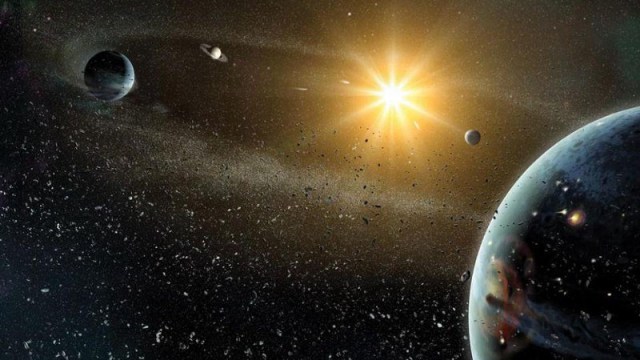Did Einstein believe in God?

Credit: Getty Images
- To celebrate Einstein’s birthday this past Sunday, we examine his take on religion and spirituality.
- Einstein’s disapproval of quantum physics revealed his discontent with a world without causal harmony at its deepest levels: The famous “God does not play dice.”
- He embraced a “Spinozan God,” a deity that was one with nature, within all that is, from cosmic dust to humans. Science, to Einstein, was a conduit to reveal at least part of this mysterious connection, whose deeper secrets were to remain elusive.
Given that March 14th is Einstein’s birthday and, in an uncanny coincidence, also Pi Day, I think it’s appropriate that we celebrate it here at 13.8 by revisiting his relationship with religion and spirituality. Much has been written about Einstein and God. Was the great scientist religious? What did he believe in? What was God to Einstein? In what is perhaps his most famous remark involving God, Einstein expressed his dissatisfaction with the randomness in quantum physics: his “God doesn’t play dice” quote. The actual phrasing, from a letter Einstein wrote to his friend and colleague Max Born, dated December 4, 1926, is very revealing of his worldview:
Quantum mechanics is very worthy of regard. But an inner voice tells me that this is not the true Jacob. The theory yields much, but it hardly brings us close to the secrets of the Ancient One. In any case, I am convinced that He does not play dice.
Einstein clearly had no qualms with the effectiveness of quantum mechanics as a tool to describe the results of laboratory experiments concerned with the world of the very small— the world of molecules, atoms, and particles. But his intuition (his “inner voice”) would not gel with quantum physics as formulated then, that is, as a probabilistic theory: “The theory yields much, but it hardly brings us close to the secrets of the Ancient One.” What could Einstein mean by the “secrets of the Ancient One”?
Taken at face value, this reads like the remarks of a mystic. The secrets of the Ancient One could well be the title of a documentary series on revelations from God. But to consider Einstein’s quote literally would be misleading. Of course, no one knows what Einstein really thought (or anyone, for that matter); we are bound by his written and recorded words, and he could easily have kept his own “secrets of the Wise One” close to his heart. The more direct interpretation is that the ‘Ancient One’ was a symbolic representation of Einstein’s own beliefs, which, in a telegram to a Jewish newspaper composed three years after the letter to Max Born, he related to a kind of all-pervading Spinozan God: “I believe in Spinoza’s God who reveals himself in the harmony of all that exists, but not in a God who concerns himself with the fate and actions of human beings.”
To Einstein, science’s goal was to dig ever deeper into the causal machinery of the cosmos, unveiling its mechanisms one by one.
This “harmony of all that exists” represents Einstein’s profound and unchanging position that there is a fundamental and all-encompassing causal order in nature that affects all that is:
Everything is determined… by forces over which we have no control. It is determined for the insect as well as for the star. Human beings, vegetables, or cosmic dust—we all dance to a mysterious tune, intoned in the distance by an invisible piper.
Einstein’s worldview reveals a strange interplay between an over-arching causality that affects all that exists in nature (human beings, cosmic dust, vegetables, stars…) but whose deepest inner workings remain unreachable and mysterious to us and to science. The tune intoned in the distance by an invisible piper is barely audible by human ears. This reminds me of another quote, this one much older, from Democritus, the pre-Socratic philosopher from the 4th century BCE who came up with the notion of “atoms” as the building blocks of everything (with his mentor Leucippus.) Democritus wrote: “In reality, Truth is in the depths.”
To Einstein, science’s goal was to dig ever deeper into the causal machinery of the cosmos, unveiling its mechanisms one by one. In true Platonic fashion, to Einstein, every scientific discovery revealed a little more of this inner harmony of all things. No wonder he rejected the probabilistic nature of quantum physics! It went precisely in opposition to his worldview that nature was “rational,” causal, and thus understandable as such by the human mind, even if imperfectly. If quantum physics worked as a probabilistic explanation, it was because there was a deeper one, underlying this randomness, that made sense from a causal perspective. Otherwise, nature wouldn’t be harmonious, and the causal chain would be disrupted, deafening the tune from the invisible piper. To Einstein, an acausal world would be a senseless world, without harmony, without divine beauty. An acausal world would be lawless and godless.
Almost 100 years have passed since Einstein expressed his worldview, and we remain confused about the nature and interpretation of quantum physics. We have learned a lot since then, of course, and current knowledge indicates quite strongly that nature really is probabilistic at the fundamental level. It may be that the invisible piper is still there, but that, instead of one of Mozart’s harmonious tunes that Einstein loved so much, the musical spirit of nature is keener on improvising, creating an unexpected harmony born out of dissonance.





